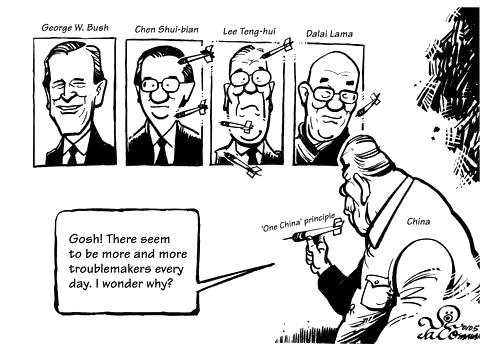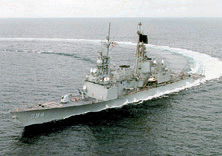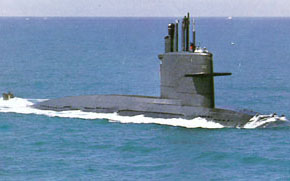 Taiwan
Communiqué No. 97, June 2001
Taiwan
Communiqué No. 97, June 2001 Taiwan
Communiqué No. 97, June 2001
Taiwan
Communiqué No. 97, June 2001
In a 25 April 2001 interview with ABC's "Good Morning America" President George W. Bush was interviewed on his first 100 days in office. In the context of this interview he was asked whether the US had an obligation to defend the Taiwanese if Taiwan were attacked by China. Mr. Bush responded: "Yes, we do, and the Chinese must understand that."
Prompted by the interviewer, who asked "With the full force of the American military?" Mr. Bush emphasized: "Whatever it took to help Taiwan defend herself."
In discussions with reporters after the Bush remarks, National Security Advisor Condoleezza Rice noted, "The Taiwan Relations Act makes very clear that the United States has an obligation that Taiwan's peaceful way of life is not upset by force. What he [Pres. Bush] said clearly is how seriously and resolutely he takes this obligation. A secure Taiwan will be better able to engage in cross-strait dialogue."
Later, Vice President Dick Cheney added his voice to those trying to clarify U.S. policy on Taiwan, saying, "I think that the appropriate way to look at it is, that the United States clearly has the capacity to come to the assistance of Taiwan should they be threatened by the mainland. What the president has done is to reiterate that very strong determination on our part, that there should not be a resort to force by the mainland in order to try to pull Taiwan closer."
Critics, including Senators Joseph Biden (D-DE) and John Kerry (D-MA), argued that the Taiwan Relations Act does not specifically oblige the U.S. to intervene on behalf of Taiwan. While criticizing Bush for overstating the obligation to defend Taiwan and not being clear about Congress' role in sending U.S. forces to war, Senator Biden noted forcefully, "I want to make it clear that I believe the security of Taiwan to be a vital interest of the United States. I remain as committed today as I was then [when the Taiwan Relations Act was passed in 1979] to the peaceful resolution of the Taiwan question."
Taiwan Communiqué comment: Mr. Bush's statement led to a heated debate whether he had shifted US policy towards Taiwan and had gone further than his predecessors.
We first want to emphasize that Mr. Bush reiterated what was clearly the spirit and intent of the Taiwan Relations Act of 1979, which states in Section 2.b.4 through 2.b.6:
(4) .. any effort to determine the future of Taiwan by other than peaceful means, including by boycotts or embargoes, a threat to the peace and security of the Western Pacific area and of grave concern to the United States;
(5) to provide Taiwan with arms of a defensive character; and
(6) to maintain the capacity of the United States to resist any resort to force or other forms of coercion that would jeopardize the security, or the social or economic system, of the people on Taiwan.
Secondly, through his clear and firm enunciation of US readiness to help defend Taiwan, Mr. Bush is ensuring that China will not miscalculate and believe that it can attack or blockade Taiwan without the US becoming involved. If it was a shift, it was a much-needed shift in response to China's increasing belligerence, threats and intimidation.
Thirdly, the fact that over the past decade Taiwan has become a blossoming democracy with a fully-functioning democratic political system, also requires that the United States moves away from the nebulous previous formulations and express clear preference for, and support of, a democratic Taiwan over a repressive China. In fact, with his statement, Mr. Bush discarded the "strategic ambiguity", which had received so much emphasis during Mr. Clinton's administration.
With just these few words, Mr. Bush also redressed the ambiguous slide of Mr. Clinton in the direction of Beijing, and in particular the infamous "Three No's" pronounced by Mr. Clinton during his 1998 China visit.

On Tuesday, 24 April 2001, the Bush administration announced the long-awaited arms sale package to Taiwan (for our pre-announcement analysis, see For the defense of Taiwan, in Communiqué no. 96). It was generally considered a robust package, containing four Kidd-class destroyers, twelve P-3C Orion anti-submarine aircraft, eight diesel submarines, the Paladin self-propelled artillery system, MH-53E SeaDragon minesweeping helicopters, AAV7A1 amphibious assault vehicles and an assortment of missiles and torpedoes.
The US also offered to give the Taiwan military a technical briefing on the Patriot PAC-3 advanced missile system as part of a possible future decision to sell the system to Taiwan to counter the threat of the some 300 CSS-6 and CSS-7 missiles, which China has deployed on the coast opposite Taiwan. The four Kidd-class destroyers were originally built in the 1970s for the Shah of Iran, but when he was overthrown they went into service in the US navy and were recently decommissioned. They will be upgraded and outfitted with modern electronic equipment, so they will be a potent force in Taiwan's navy, designed to counter the Sovremenny destroyers China purchased from Russi
The advantage of the Kidd-class destroyers is that they are available in the relatively short term _ two to three years _ and will give Taiwan's navy an opportunity to learn to operate a relative large and complex naval system, and prepare for the operation of the even more complex Arleigh Burke class with Aegis at a later date.
The proposed sale of twelve P-3C Orion submarine-hunting aircraft was clearly prompted by the major threat presented by the some 60 Chinese submarines has in operation along the coast, including four Kilo-class subs purchased from Russia. Taiwan at present has only approximately four aging Grumman S-2T Turbo Tracker aircraft in operation.
While the Bush administration decided not to go ahead with the sale of four Arleigh Burke class destroyers outfitted with Aegis radar at this time, it indicated that it still could do so at a future date.
The Bush team clearly linked the future sale of Aegis and the PAC-3 defensive missile to China's Medium Range Ballistic Missile (MRBM) threat against the island, indicating that if China reduces or dismantles these missiles, then such defensive systems might not be needed, but if China continues the threat, the sales will go ahead in due time.

A more puzzling picture was presented by the decision to sell eight diesel submarines: the US at present has no capability to built such submarines, because since the 1960s US shipyards have focused exclusively on the design and construction of nuclear-powered submarines. Press reports following the announcement indicated that the US was contemplating building the subs in the US based on either German or Dutch design, but spokesmen from both those governments indicated that they didn't intend to grant licenses for the export of their respective technologies.
Taiwan at present operates only four submarines, two of which are WW-II vintage Guppy-II class vessels which are used only for training, while the other two are Dutch-built Swordfish-class subs delivered by the Dutch Wilton Fijenoord shipyard in 1986-87. In view of China's 60+ submarines (including four Russian Kilo-class) Taiwan's navy is thus faced with overwhelming odds, and clearly needs additional subs to build up its defenses.
Taiwan Communiqué comment: It is hard to understand the Dutch and German refusal to grant a license for their technology to be exported to the United States. The two governments are hiding behind their "One China" policy and are clearly letting themselves be intimidated by China. Just as importantly, they fail to understand that there is now a new and democratic Taiwan, which is totally different from the time when their "One China" policy was devised.
By failing to go along with the US proposal, they side with a repressive, Chinese Communist regime against a small, nascent democracy in Taiwan, which is trying to gain its role as a full and equal member in the international community.
The Netherlands, Germany and other European nations need to wake up to the fact that their policies are outdated products of half a decade ago, when the Nationalist regime of Chiang Kai-shek still claimed to represent China. The new Taiwan of President Chen Shui-bian simply wants to represent itself and be left alone by its giant neighbor. This new situation requires a new European policy.
Back to: Table of Contents
Copyright © 2001 Taiwan Communiqué